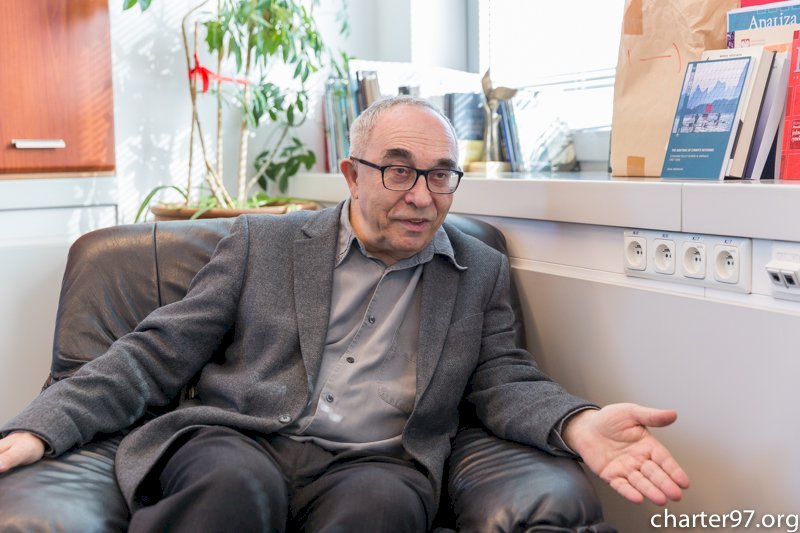Hersh Smolar, The Unknown Hero Belarus Can Be Proud Of
- 28.06.2019, 14:30
- 14,508
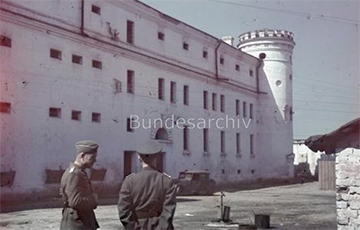
PHOTO: BUNDESARCHIV.DE
Why was the history of the Minsk ghetto silenced first by the Soviet power, then by the Lukashenka regime?
The point here is not only in the anti-semitic essence of dictatorships, but in the struggle of the Jews in one of the biggest ghetto in the territory of the USSR being a unique example of resistance to totalitarianism. Just imagine: over 5 thousand prisoners were rescued from the Minsk ghetto and sent to guerrilla detachments in two years!
Editor-in-Chief of the Charter97.org news website Natallia Radzina has taken an interview from Alexander Smolar, the son of leader of the underground combat organization in the Minsk ghetto Hersh Smolar.
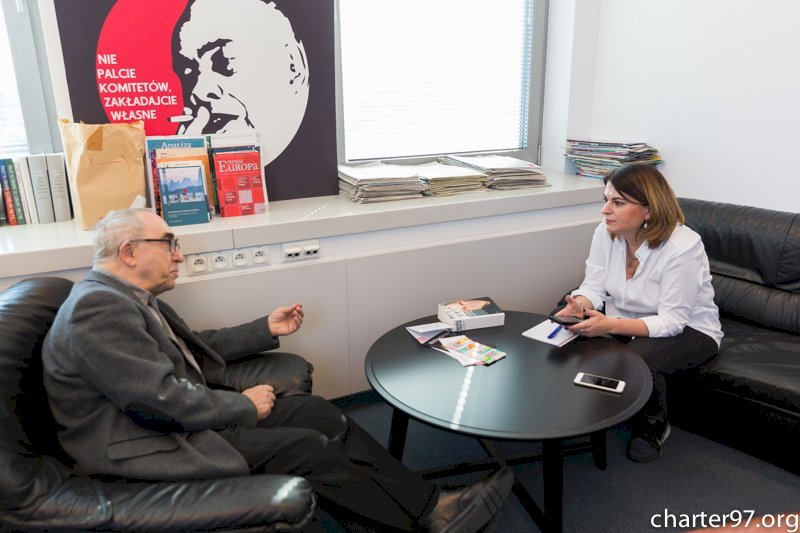
- This is a great honor to speak to you, a legendary person, and the son of a legendary person. Your father Hersh Smolar was the leader of the Minsk ghetto underground and the head of the Jewish guerrilla detachment in Belarus. Did your father often recall the war?
- Father did not speak much about those events, although I do remember certain things from the conversations. Of course, I read his book The Ghetto Avengers, which was published after the war. This is the problem of all children: when we start having questions to our parents, then, as a rule, they are no longer with us.
I can say that I read quite a lot in various sources about the activities of my father, I heard something from him also.
- How did it happen that Hersh Smolar appeared in the occupied Minsk?
- In 1939, my father was in a Polish prison as a Communist. My mother was also under arrest. When the German attack began, the prison guards abandoned the inmates. My parents, who were in different prisons, went to Bialystok and met there. Then for some time they worked in the Communist press: my mother cooperated with a Polish newspaper, my father headed a Jewish one.
On June 22, 1941, when the German troops launched an offensive against the USSR, me and my mother were evacuated by train into the interior of the country. Father went in the Minsk direction by foot. This story is described in the book by the famous historian Timothy Snyder Bloody Lands. In it, he tells how my father met a famous person in Minsk - Slawek. They decided to organize an underground movement together. At that time, the Soviet authorities had already fled from the capital.
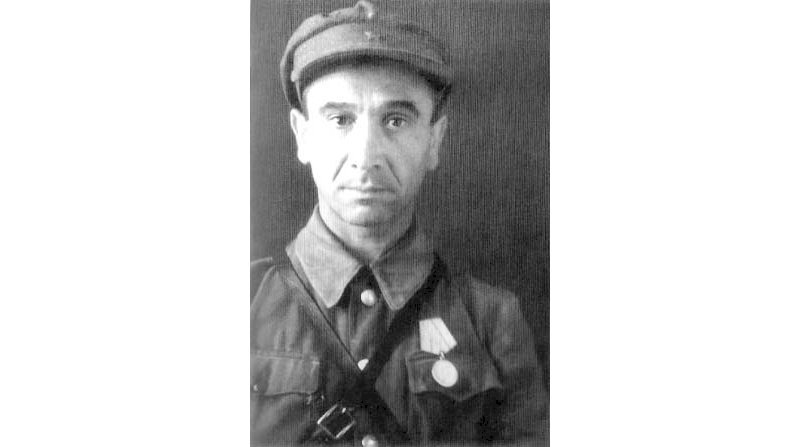
PHOTO JEWISHFREEDOM.ORG
- I read the book The Ghetto Avengers and noted this moment: the creation of the Minsk underground became possible thanks largely to the activity of the Jews, living in Minsk at that time.
- Yes. Slawek was highly surprised by my father’s proactivity, and thought he had some instructions from the Communist party. Father replied that it was not so. I understand Slawek’s bewilderment, as, in the Soviet realm, it was simply impossible to come up with such an initiative without the prior approval of the top party leadership.
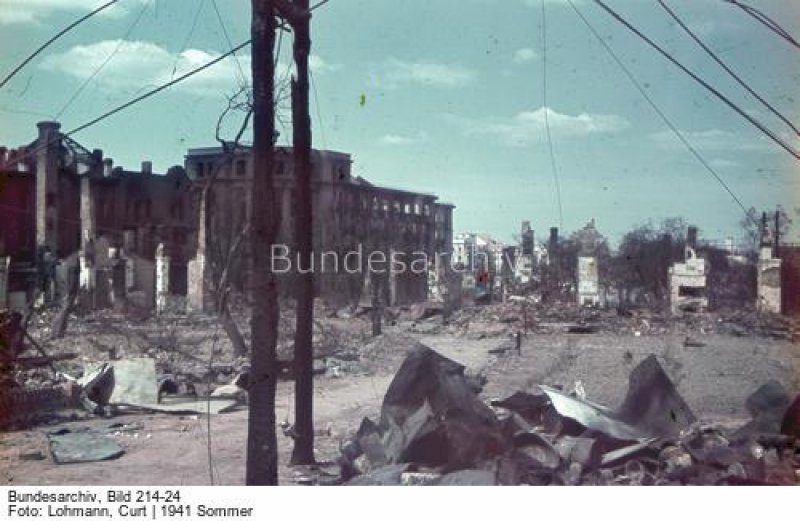
PHOTO: BUNDESARCHIV.DE
- Besides, about Slawek. Do you know that this is an underground pseudonym of Isay Kazinets, one of the leaders of the Minsk underground? He acted together with your father under occupation, and his nicknames were “Slava”, “Yurigin”, “Slavka Winner”. Kazinets became the protagonist of the book The Ruins Fire Point-Blank, was honoured with a Hero of the Soviet Union title. There is a street named after him in Minsk.
- I heard this name, but not in my father’s recallings. He always called him Slawek. Thank you for the information, it is important to know the names of such people.
After the meeting with Slawek, father organized not only an underground movement in the Minsk ghetto, but also acted as one of the initiators of the organization of resistance to the fascists in the capital of Belarus.
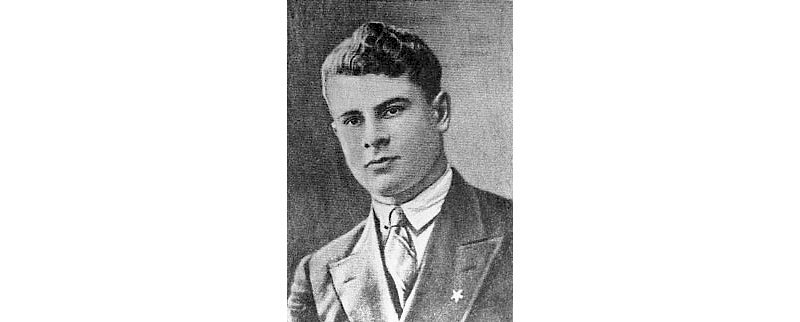
This is very interesting from a psychological point of view. Father was an old Communist. In 1921, after the Polish-Soviet War, at the age of 16, he had to flee from Poland. He spent the 20s in the USSR. However, he had a Polish mentality. It simply did not occur to him that the organization of resistance to the invaders needed some kind of recommendation and permission. He was not a Soviet man, although he was a Communist.
- It comes as a surprise that the Stalinist censorship let the story about this to appear in the book, published in 1947.
- Yes, it’s very curious that it remained in the book, as this was sheer compromising: the authorities fleeing from the capital of Belarus, having left no instructions, no support.
- The Ghetto Avengers is a very hard book to read, but your father built the plot in such a way that, while depicting the horrors of the life in the Minsk ghetto, where over 1 000 people were killed, he made the Jews’ struggle for the life and freedom of their people the central theme. Creating a powerful underground movement, enrolling thousands of people to the Belarusian guerrilla detachments, organization of seven Jewish guerrilla regiments - this is unbelievable! How did it become possible? We all know about the sad destiny of practically every ghetto in the USSR and Eastern Europe…
- I think that there is certain peculiarity here. In the Minsk ghetto, there was a very strong underground. It even got to some curious situations. For example, when the Germans looked for my father, he was hidden in the hospital so well that they did not find him. It is very difficult to imagine. A strong underground movement was a significant factor.
In addition, the Minsk ghetto was not as isolated from the outside world as the Warsaw one, where there was a huge wall, which complicated movement. It was quite easy to get out of the Minsk ghetto.
The third circumstance, which I consider to be very significant and at the same time specific, is that the Judenrat (Jewish administration created by the German authorities - Charter97.org) cooperated with the underground and the guerrillas. The leaders of the underground movement had good relations with the leadership of the Judenrat. Somehow they even threw my father's passport covered with blood in the streets of the city, so that the Germans thought that he was dead.
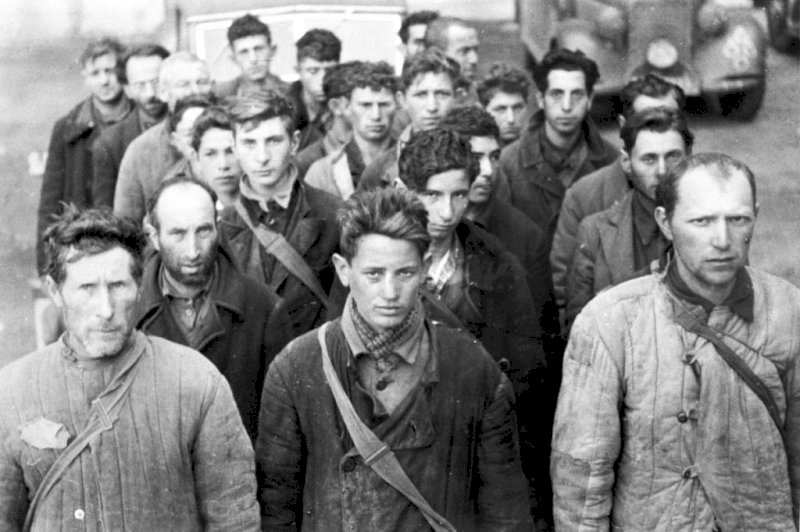
Another important factor was the support from Belarusians.
Of course, all this contributed to the success of the underground movement in Minsk, but I cannot say which of them were decisive.
- In the Minsk ghetto, an entire infrastructure of an underground was created in a very short time: in the infectious diseases clinic, where the Germans were afraid to go, they set up headquarters, the participants of the resistance movement divided into “tens”, they formed storehouses with weapons, medical supplies, food for the guerrillas; there appeared a typography where they printed newspapers and leaflets, made radio receiving sets to get news from the front. They organized hundreds of bunkers to hide from the mass executions, the underground activists were helped by the doctors of the ghetto, there were proxy allies in the Judenrat, including its head Ilya Mushkin, who warned about upcoming “purges”. The underground activists from the ghetto organized sabotage and subversive actions at enterprises, damaged equipment and products that went to the German troops at the front. In many aspects, this was connected with the organizational skills of your father, who was a famous Polish revolutionary at a time, right?
- To a certain extent, yes. I cannot answer unequivocally. Of course, his experience in revolutionary activities, will and organizational skills greatly facilitated the work in the underground, but the qualities of one person cannot be the key factor in this matter.
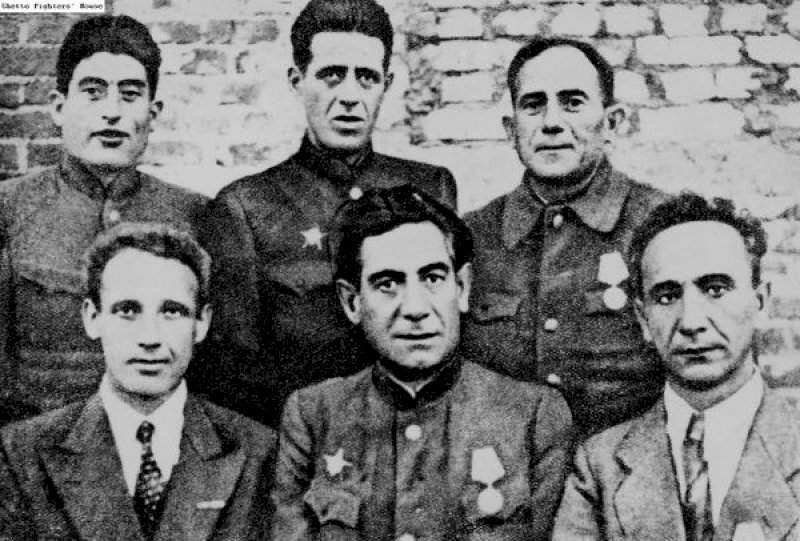
Again, the Minsk ghetto was not so closed, and this fact was of a great influence; then the good relations of the underground men with the Judenrat - everything played its role. The book, of course, does not say a lot about this. For example, the relations with the guerrilla movement are not described in much detail, like, where they got weapons and equipment from. I suspect that they received all this from the guerrilla detachments that were hiding in the forests. But I can’t be 100% sure and, unfortunately, I will never know.
Father really had a great experience. When my father was 15 years old, he organized the Union of Socialist Youth in his hometown of Zambrow. It turns out that the basics of underground activities were familiar to him. My father joined the Provisional Revolutionary Committee of Zambrow when the Red Army entered the country. The Poles viewed this organization as a threat to the country's independence, but the father was an ardent Communist and joined and supported this movement. In his 15 years he was already a member of the city council of Zambrow.
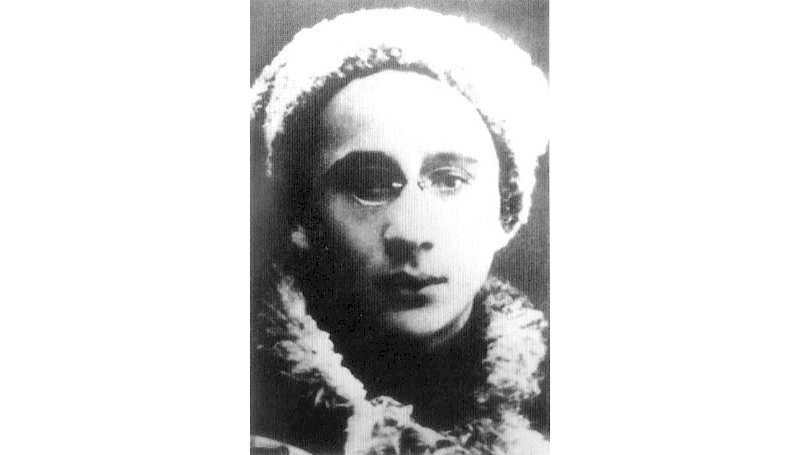
Then he had to cross the Polish-Soviet border. My father was a publisher of many newspapers in the USSR, a Komsomol activist in Kharkiv and many other cities. He describes these events in his memoirs, which, unfortunately, have not been translated and are available only in Hebrew and Yiddish. Undoubtedly, he had a great experience as an organizer.
Then he was sent by the Comintern to Poland, where he worked illegally in the Communist Party of the Western Belarus.
A large list of acquaintances in Belarus, the experience of an underground worker, experience in senior positions - all this gave him the opportunity to lead the resistance in the Minsk ghetto. There were simply no people in the ghetto who could boast with such a record.
- In his book, Hersh Smolar writes: “Without the fraternal help of the Belarusian population, not a single Jew would have stayed alive. Herein, thousands of them survived.” He cites a huge number of stories how Belarusians saved the Jews, hid children at their places, supplied food and weapons to the ghetto, and how the Jews saved Belarusians: dying of starvation, they managed to organize the supply of food, weapons, medical preparations, warm clothes, to guerrillas and underground activists. They even registered wounded Belarusian guerrillas as Jews, to treat them in the ghetto hospital. Where, in your opinion, do the roots of the Belarusian-Jewish solidarity come from?
- First, Belarus has always been a less nationalistic country than Ukraine, Poland, Russia and other neighboring countries. Of course, this had its flaws. The Belarusian independence movement, when viewed from a historical point of view, was weaker than in the neighboring countries. However, there are positive points in this if we are talking about the attitude towards national minorities. Therefore, Belarusian traditions and customs played a big role in this.
Why was there such a good attitude to the Jews in some European countries? Bulgaria, for example? (In Bulgaria, almost the entire Jewish population was saved from extermination - Charter97.org). This is the result of cultural ties, traditions and experience of the people, a good attitude towards the Jews by military organizations, such as the guerrilla movement. Important to note, the Jewish guerrilla detachments were associated with the Soviet authorities, with Moscow, and this played a significant role.
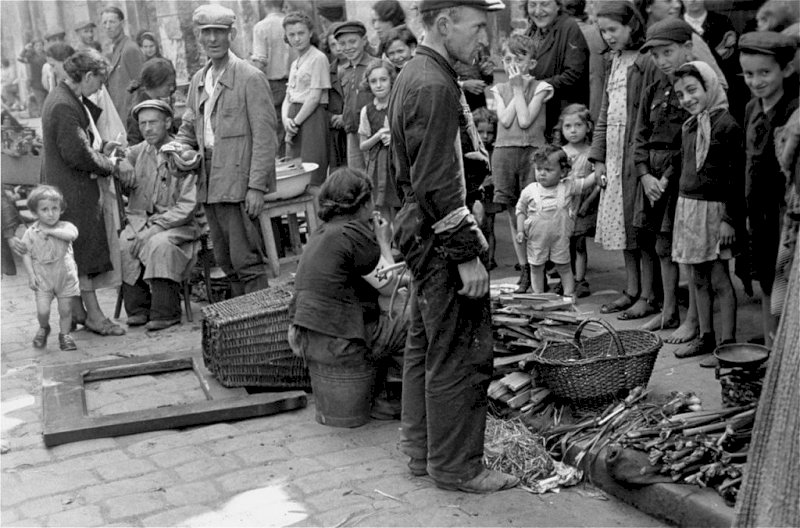
In Belarus, there were units of the Armia Krajowa, because the Polish diaspora was widely represented in Belarus. These units were not connected with Moscow, but with the Polish underground and the emigration government created in London.
The Communist guerrilla movement, controlled from Moscow, dominated, but there were natural connections and cooperation between various units.
- I think that the reasons behind such solidarity could be connected with the common history of the two nations. The Jews settled in the territory of the Grand Duchy of Lithuania back in XIV century.
- Absolutely. We know though that there were countries where Jews had appeared earlier, but were subsequently expelled. Therefore, I do not think this is a decisive factor.
I think that the main qualities are the Belarusian openness and tolerance towards other peoples, the absence of radical nationalism, which negatively manifests itself towards others. This is a serious factor. This shows the difference between the two neighboring countries - Belarus and Ukraine. The fate of Ukrainian Jews is not always associated with positive memories.
I don’t know whether religion played a part in this matter. It remains unknown to me either whether the Orthodox Church is more tolerant towards the Jews than the Catholic one.
- There’s another amazing moment in the book, let me quote: “The mission of our comrades, despite special difficulties, also included the demoralization of German military units. In many places we were able to contact the mobilized Slovaks, Dutch, Austrians and others, and, with their help, spread the truth about the Nazi predatory campaign, about the atrocities of the fascists. There were cases when such soldiers, propagated by us, drove our people in German cars to the areas adjacent to the guerrilla bases.
The Jews engaged in forced labor in the Government House, where the headquarters of the Nazi air unit was located during the occupation, suddenly began to notice a dramatic change in the mood of their warden, the Hitlerite officer Schulz. He became less ferocious, stopped using foul language, and then disappeared altogether. Along with him, 37 Jewish workers disappeared (among them were German Jews). All of them went to the guerrilla detachment in a car that Schulz got them.”
Did Hersh Smolar tell you about it? How did they manage to do such things?
- The story of Schulz, which my father told me, is truly unique. As for other nationalities’ influence on the military - I do not know how strong it was. Maybe these were individual cases - my knowledge is very limited in this matter.
However, such individual cases occurred everywhere. After all, quite often the German soldiers were the mobilized teachers, traders, lawyers, who before the war could be socialists and hide their political views. Surely, these were particular cases where people personally experienced the shocking truth about the massacres of civilians and were forced to somehow react to it, to do something.
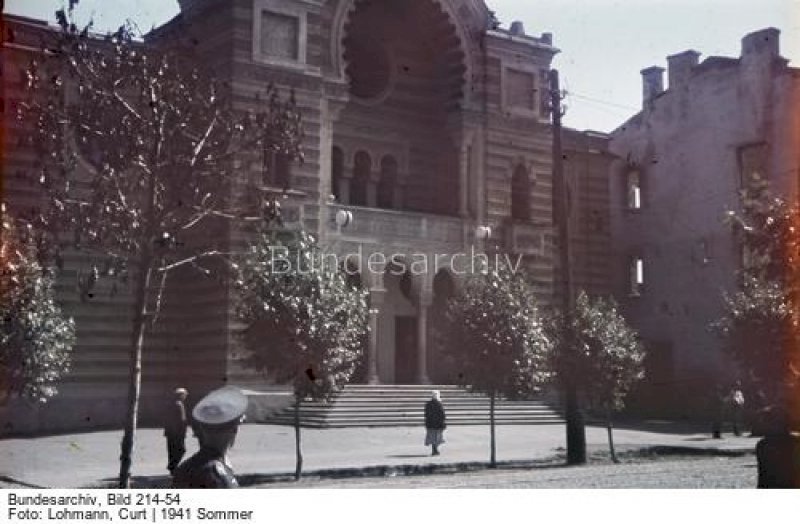
PHOTO: BUNDESARCHIV.DE
This required personal courage: there were few such people, but they were. The Germans were not a monolithic force, not all were Nazis, there were people who, because of cowardice, hid their real views. Many did not like what was happening in Germany, and even more so in the occupied territories, including Belarus.
- Do you remember the details of Schulz’s recruitment from what your father told?
- Unfortunately, I don’t know the details. You should understand me, my father was a very busy man. He worked from early morning until night. It was not possible to have long conversations. I can say that today I regret not having more of these talks. However, at that time, neither he nor I had such urge.
My father was not a typical pensioner who sat and recalled the affairs of the days gone by. In Poland, he had a very active life in which there was no time for memories.
- Hersh Smolar, risking his life, did not leave the ghetto till the last moment, trying to save as many people as possible. 5 000 people managed to make it to the woods altogether. Was it a difficult decision for him - to leave Minsk in the end?
- I think it was a well-weighed decision that was linked to the needs of the guerrilla movement and the ghetto situation. It seems to me that my father was very glad that he would fight in a guerrilla detachment. Many problems were connected with taking this decision: how to leave the underground in the ghetto in reliable hands, how to ensure supply, the transfer of the remaining units to the guerrillas - all this was the subject of his responsibility and concern. Therefore, being in the forest, in a guerrilla detachment, he felt a kind of relief, because now this responsibility was shifted from him.
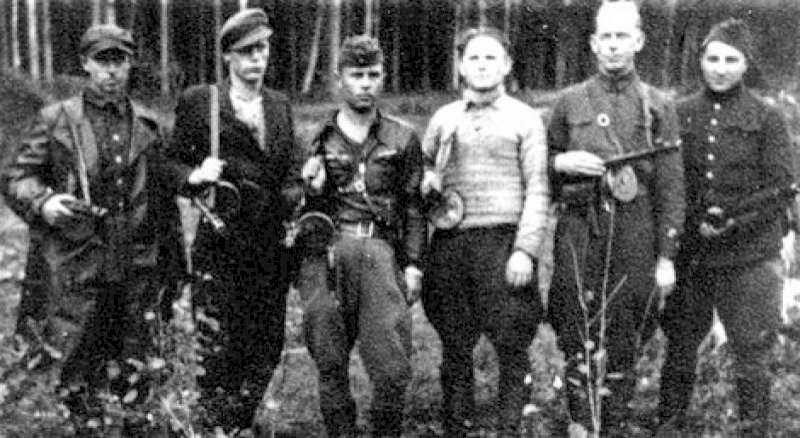
- What did your father tell you about his activities in the guerrilla regiment in the Naliboksky Forest?
- Sometimes he talked about the conflicts that occurred in the work with other guerrilla detachments. He talked more about heroic deeds: how they derailed trains, about the attacks on the German troops. He told about the things that are always pleasant to remember, because this is the heroic side of the story.
The down-to-earth, domestic side of the guerrilla detachment was not so interesting. Yes, at that time it was important for him, but from the point of view of retrospectives - heroic deeds, evidence of courage and successful actions of guerrilla detachments remained in the memories.
- What didn’t get into your father’s book? As it was published in Moscow in 1947, when Stalin was still alive, and the censorship was very strict then.
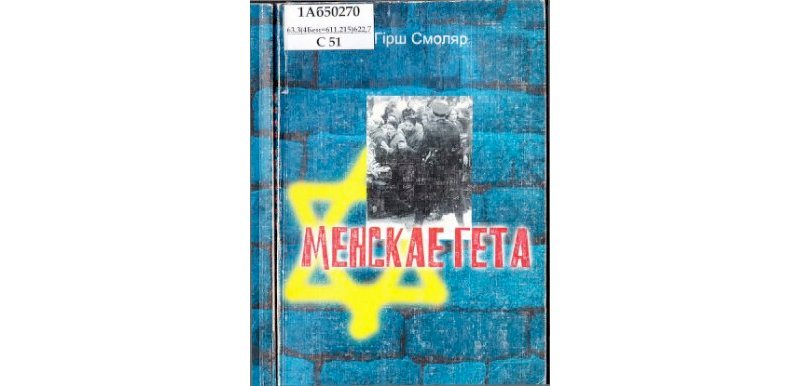
- I can say for sure that the book does not describe my father’s complex relationship with the party leadership when he left the ghetto. He had very tense relations with Panteleimon Ponomarenko (first secretary of the Central Committee of the Communist Party of Belarus in 1938-1947 - Charter97.org). He had a very negative attitude towards my father, so dad was afraid for his life.
This was why he decided to leave for Poland as soon as possible. This negative attitude was the result of hidden anti-Semitism. For example, when a parade was held in Minsk after the end of the war, the Jewish troops wanted to take to the streets with everyone to show their involvement in the victory. But the party authorities in Minsk did not give permission for this.
In addition, as father recalled, there were many unpleasant conversations with Ponomarenko. “How can it be that no one loves you?” Said the first secretary of the Central Committee to my father. It was for this reason that he felt like a stranger, felt distrust and threat. My father understood very well how the Soviet Union works, because his closest friends died during the “purges”.
An invitation from the Polish Workers' Party and the decision to leave the USSR saved his life. My father was associated with the Jewish Anti-Fascist Committee, and almost all of its members were destroyed by Stalin. One of the few who managed to escape was Ilya Ehrenburg.
No matter how paradoxical it may sound, Poland twice saved my father from death in the USSR. The first time was in 1927, when he as one of the Polish Communist leaders was summoned to Moscow. Back then, father was in a Polish prison and was lucky not being able to go. The leadership of the Communist Party of Poland, which was located in the USSR, was completely exterminated. Then he was saved by the “sanation” Poland. And after the war, he was saved by the Communist Poland.
My mother and younger brother Eugeniusz, who was born in Minsk, stayed in Belarus until 1947, and then returned to Poland. Father left earlier, which helped him not to share the fate of the Jewish writers, scientists, intellectuals during the “struggle with cosmopolitanism” in the USSR. He was able to resume contacts with the friends who stayed in the USSR only in 1956.
In the same year, father published the world-famous article Our pain, our hope, in which he spoke about the destruction of the Jewish elite by Stalin. This article was reprinted by all world publications. For this reason, in 1956, my father felt in danger, because there was no complete certainty that the Soviet troops would not enter Poland.
I can say that he had excellent relations with Belarusian writers Maksim Tank and Yanka Bryl. These were his close friends. Maksim Tank even dedicated a poem to my father when he decided to move from Poland to Israel in 1968. The poem was called “To Grisha” - that was the pseudonym of my father.
- Maksim Tank and Yanka Bryl are the classics of the Belarusian literature, they are studied at schools.
- Herein, they were close friends of my father. I heard only very good, warm words about them.
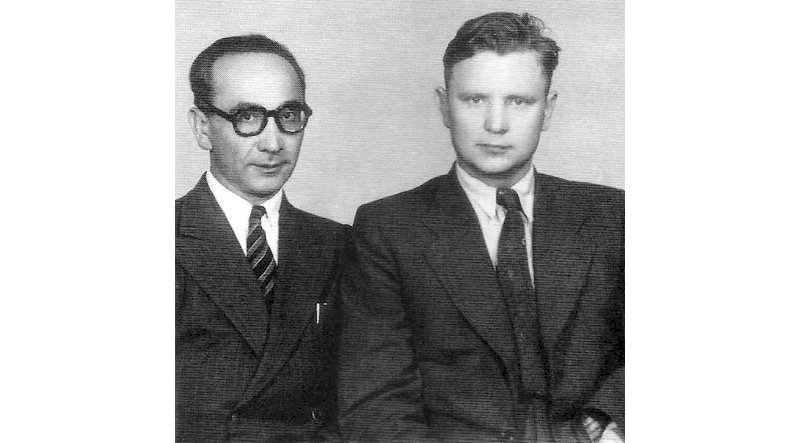
- What did he tell about them?
- It is difficult to talk about it outside the context of friendship, cordiality, sincerity, which were in their relationship. Yanka Bryl and Maksim Tank often came as part of the Soviet delegations to Poland. My father met them all the time.
He knew them since pre-war time. Since the time of their joint work in the Communist Party of the Western Belarus.
- In the after-war time, your father was the Chairman of the Central Committee of Polish Jews, the Chairman of the Civil and Cultural Association of the Jews in Poland, the Editor-in-Chief of the newspaper Fołks Sztyme. During the events of March 1968, he was expelled from the party. However, in 1970 he left for Israel through Paris. Why?
- Initially, my father was removed from the board of the Social and Cultural Society of Jews in Poland. He was removed from the board of the newspaper in July 1967, after Israel’s six-day war with the Arab states. At that time, the policy of the USSR and the entire socialist camp was extremely anti-Israeli, because the victory of Israel was a strong blow to the Soviet Union. Moscow armed the Arab countries. Countries like Egypt, Syria, Iran were very dependent on Moscow at that time. The defeat of the Arab countries was the defeat of the Soviet weapons, the defeat of the strategy of the USSR and those Soviet officers who trained them.
Due to the above, attacks on Israel began in the socialist camp. There were many things that they said: an imperialist colony, US puppets, etc. At the same time, the anti-Semitic campaign began in the USSR and many countries of Central and Eastern Europe. But not all. In Romania, under the dictator Ceausescu, who wanted to pursue an independent policy from Moscow, there were no attacks on the Jews. In Poland, there were.
I, for example, went to prison in 1968. Thousands of students were arrested. The whole campaign took place in an atmosphere of ardent anti-Semitism. Students who went to anti-Communist demonstrations were accused of having links with Zionists. Such atmosphere reigned here.
The newspaper in which my father worked was Communist, but at the same time Jewish. He simply could not print all this propaganda and tried to sidestep the topic. Of course, the party could not tolerate it, and father was expelled from the newspaper. He became jobless, so he wrote books, but there were already very few Jews staying in Poland.
This policy forced most Jews (about 15-20 thousand) to leave Poland. My father received two invitations: from the USA, where there were so many Jews, and from Israel. In the end, he chose Israel. The Polish authorities did not want to let father go abroad. He was too famous in the Jewish world.
Then father received an invitation to come to France from Jean-Paul Sartre and the Jewish writers of this country. The reason for the invitation was that they needed him as a consultant for the preparation of a collection of Jewish poetry.
The Polish authorities understood that this was a fiction, but they let him go. From France, my father moved to Israel and lived there until the end of his days. In Israel, we visited him with my brother, sometimes he came to us. At that time I was in exile in Paris, and my brother first lived in Sweden, and then moved to London. Mom stayed in Poland.
- Wasn’t she persecuted in Poland because her whole family emigrated abroad?
- My parents were wonderful people, both had their own hobbies. Mother specialized in the history of Poland, was a professor at the Academy of Sciences. She would not have found a place for herself abroad. Therefore, they decided that they would move to where they can realize their professional skills.
My father went to where the Jews were, and mother stayed in Poland. Nobody persecuted her, she worked in the Polish Academy of Sciences and sometimes came to visit us.
- Reading the book, I came to the conclusion that your father had sacred faith in the ideals of Communism. However, he had to flee from the Communist Poland. Had Hersh Smolar reassessed his views?
- Of course. Father never ceased to be a man of leftist views, but he was especially disappointed in Communism after debunking the personality cult of Stalin by Nikita Khrushchev, when the facts of the crimes of the Stalinist regime became revealed to the public. He guessed about the extermination of the Jewish elites, but he still had many illusions.
You know, the Communists in the West said that according to Marx, communism was supposed to appear in developed countries, where democracy exists, and all the crimes in the USSR occurred because Communism appeared in a backward country, where there was no democracy. Hence the dictatorship and violence.
My father ceased to be a Communist, but he still had certain socialist hopes, a desire to achieve social equality and justice.
When father left for Israel, he was rather critical about the government of this country. He had no enthusiasm. Hersh Smolar was an independent man with critical thinking. Probably, this is why we had many problems in communication. I was getting more and more anti-Communist, was involved in the struggle against the current government. Against this background, we had a lot of controversy.
My father was very interested in what was happening in Poland, in the USSR, and maintained contacts with old friends. In addition, more migrants from the Soviet Union moved to Israel. He spoke Russian with very many acquaintances.
- Which language did you speak in the family?
- We spoke Polish. My father's mother tongue was Yiddish. He spoke it since childhood, wrote books in it, used in journalistic work.
Mom did not know Yiddish. She understood a lot, because she knew German well. Neither I nor my brother knew this language. Polish culture prevailed in our family.
- How was the life of the famous Minsk underground activist and partisan in Israel?
- It seems to me that it was not bad in domestic terms. Yes, the authorities did not like him and many Israelis had complaints about him, because he, as a Communist, stood against the relocation of the Jews to Israel. But it happened so that he had to go against his own rules. He always believed that it was necessary to restore the Jewish life in Poland. For a long time, father could do this in the framework of public organizations, Jewish associations, Jewish theater, newspapers and publications. For a small number of the Jews in Poland, it was a rather rich cultural and social life.
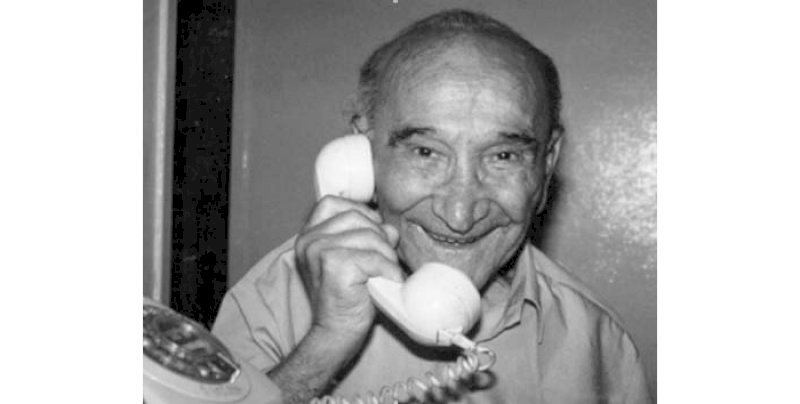
My father got a job at the university in Tel Aviv. He also wrote books. He has written at least three books of his memoirs. Described the 1920s in the USSR. I believe that this book would be interesting for readers from Belarus and Russia. He also published an edited book of memoirs about the war, and then a book on post-war life in Poland.
Father worked a lot, he lived modestly, but he had quite good living conditions. He lived in a special house for people who needed help. It was not a classic nursing home. Twice a week, a woman came to him to cook and clean up.
In addition, he participated in the literary life of Israel. Especially as a Yiddish writer. Yes, he learned Hebrew, but I don’t think he knew the language well. He also had a large social circle, and with the increase of emigration from the USSR this circle only expanded.
- Did he get to love Israel? I mean, moving to another country in a senior age is quite a serious step.
- I think that it was a bit hard for him, as for every adult person who decides to emigrate. However, at the same time, Israel is the country of its people. In Poland, there are almost no people left who speak his native language.
Many in Israel knew my father since the time of the war and the underground movement. I was personally acquainted with such people. They took care of him. He was provided with material assistance.
His cousins lived in Israel. My father was even buried in a kibbutz, where the members of our family worked and lived. We were far away from him, we could talk on the phone, write letters to each other.
I can say for sure that in Israel he had a more eventful life than he could have in Poland if he had stayed. According to him, Poland is “empty”. The people with whom he could communicate left the country.
- You were in jail under the Communist power. Why?
- I was very passionate about what can be called dissident activities. When I was a student and then an assistant at the University of Warsaw, I had serious disagreements with the Polish authorities.
Poland was a more open and tolerant country than the USSR. For a long time, dissent was allowed. However, 1968 came and many people were arrested. I spent only a year in prison, but it brought many difficulties into my life. Of course, I was expelled from the university. I had to take accidental jobs to scrape a living, and then I decided to emigrate. Most of my family had already left Poland. I spent a year at an American university in Italy, and then I moved to France, where I got a job at the National Center for Scientific Research (Center National de la Recherche Scientifique, CNRS).
At the same time, I helped my friends in Poland. Together with my brother Eugeniusz and other members of my family, we published the magazine Anex, books, and financially helped friends. We also represented many social movements and forces in the West. In addition, I had many contacts with immigrants from the USSR - Vladimir Maximov, Natalia Gorbanevskaya, Leonid Pliushch. At that time, immigrants from our part of Europe maintained contacts and collaborated with each other.
- Your father was a Communist. How come you grew up an ardent opponent of this ideology?
- In childhood, of course, I was a “little Communist”, I was a member of the Communist Youth Union, even a member of the Communist Party when I was studying at the University of Warsaw. Subsequently, I was expelled from it.
I was a person with critical thinking and believed that Poland and the USSR should follow the path of democratization. I also believed that the economies of our countries should change and become market-oriented, but at the same time remain socialist. I was sure that the Communist Party had to initiate these changes.
Still, the situation in Poland was extremely different from the situation in the USSR. Even at the party meetings at the University of Warsaw, we talked about the Soviet totalitarianism. Yes, these ideas could not be carried beyond the walls of the university, or published anywhere, but we were free in many aspects.
I became increasingly oppositional and critical towards the government. Honestly, everything got me. In 1968, I was expelled from the university. Then I became very interested in what could be called dissident activities.
By the way, many representatives of the dissident movement have similar biographies. In the countries with dictatorial regimes (for example, in Spain), the rebellious young people were the children of the local elites. They were disappointed in what their parents told them. At the same time, they did not believe that they could be sent to prison. I didn't believe it either.
Quite often, the children of the nomenclature were brought up under the romantic ideas of Communism. And then, in my own experience, they understood that not everything looks so perfect and rosy. Most of the Poles simply did not believe in Communism, but, unfortunately, they had to tolerate it.
For the children who were raised in families like my own, the reality appeared shocking. This caused a rebellion. The result of this rebellion was finding own way. For example, I was close to the ideas of social democracy.
- It turns out, you ruined your father’s career?
- Not exactly. Yes, he was constantly told about mine and my brother’s protest activities. However, dad paid for his own misdemeanors. Apart from this, he fell a victim of the anti-semitic campaign in Poland. Anti-semitic allegations were used against me as well. However, this wasn’t the reason for my arrest. The reason was organizing of a student riot in 1968.
- You returned to Warsaw in 1989 and became an advisor to Tadeusz Mazowiecki. How did it feel – to work with the first Prime Minister of the free Poland?
- I knew Tadeusz Mazowiecki since the time of emigration. He called me during the visit to Paris, and we talked for a long time. When Tadeusz Mazowiecki became Prime Minister, I returned to Poland, not immediately though.
The first job offer for me was the post of an ambassador. Mazowiecki made a more interesting proposal - the position of his advisor. And then - the head of his advisors. Later, I was an advisor for another Foreign Minister, Hanna Suchotska.
What was happening was amazing. For twenty years I have been in exile. Yes, I maintained constant contacts, read, took interest to everything related to Poland. Still, being in emigration, you cannot be 100% informed. Not to mention the fact that a number of public figures have appeared, whom I did not know.
I tried not to speak out on those issues where my competence was limited. Where I had knowledge, and I mean foreign affairs, political organization, I spoke. When it came to other areas, I resorted to expert advice. From every point of view, it was a great time for Poland and for me.
After 20 years of emigration and living in a foreign land, I was in the center of the political life of Poland, and participated in the creation of political parties. I had a hand in creating some left-liberal parties in the late 1990s. Fate brought me together with such great people as Tadeusz Mazowiecki, Jacek Kuron, Bronislaw Geremek. Unfortunately, they are not with us today. A younger friend with whom we worked together was Adam Michnik, today he is the Editor-in-Chief of the very influential Gazeta Wyborcza. But still, we can say that he belongs to the outgoing generation.
- You have headed the Stefan Batory Foundation for over 20 years. When a man of ideas work at one and the same place for so many years, he, most likely, performs a certain mission. How do you see your mission?
- Not everything is so simple. It partly comes from my mission, and partly - from my life situation. When we left Paris, my son, a journalist for the French newspaper Le Monde (today he works as a correspondent in Jerusalem and his articles appear daily on the pages of this publication) brought me a kind of contract that said that, after finishing my work in the government of Mazowiecki, we would return to Paris.
The son wasn’t enthusiastic about the return to Poland. My wife, who works in Paris, also did not think that she would have to return. Therefore, I had personal problems: how to combine family life and my interests in Poland. The choice of the fund was determined by the fact that I needed to live both in Paris and in Warsaw. Intellectual life, wife and son - in Paris, and on the other hand, my daughter chose Poland. By the way, my daughter Anna Smolar is a famous Polish theater director. She got married in Poland, and she has two beautiful children.
Therefore, speaking in personal categories - I live in two worlds, thus bringing the family together. I had a lot of offers connected with politics. But, proceeding from my personal reasons, I did not go there, although there were proposals from the Seimas and the government.
In addition, I really like the mission of the Stefan Batory Foundation. We are engaged in the dissemination of democratic ideas, helping various initiatives and NGOs, the development of science.
We are quite successful in the international field. The Stefan Batory Foundation has always been active in cooperation with Belarus, Ukraine, and Russia. We are also continuing to do our job inside the EU, we are promoting the ideas of the European Union. I can say that the choice of the foundation lay at the crossroads of personal necessities - the search for a life model that would allow me to combine everything with the scientific work in Paris. After politics, my main hobby is science.
Working at the Stefan Batory Foundation allows me to go to Paris, work at my institute, meet with my family and live in Poland at the same time. When I leave Poland, everyone asks “when will you return?”, when I leave Paris, they also ask “when will you return?”. Sometimes I joke that I feel better on the plane.
- Why is nothing done in Belarus for the preservation of the memory about the Minsk ghetto? I am now forced to live and work in Warsaw, so I have something to compare. Museums, monuments, memorial shields reminding about the Warsaw ghetto are seen everywhere here. In Minsk, the territory of the ghetto, which covers the entire city center, is not even marked with ordinary lines on the asphalt.
- This is a very interesting question. I think this is partly because the Warsaw ghetto was the largest ghetto, it had the biggest number of victims, it was in Poland that the largest number of Jews were killed. Moreover, in Poland there was the most terrible death camp - Auschwitz-Birkenau. By the way, there were a large number of other ghettos in Poland. For example, in Bialystok, where there was also an uprising.
Another reason is that the USSR was not interested in disseminating information about the ghetto and the particular fate of the Jews. No one wrote about this. The Soviet Union could do nothing with anti-Semitism. Secondly, when Israel appeared, the Jews became a threat to Communism. They were considered spies and foreign agents.
In Poland, they always wrote about the ghetto, there were constant contacts with the West on this issue. In the USSR, almost nothing was written about the Minsk ghetto. If you take a wider section of the society, then no one knew anything about it. The older generation of Minsk residents did hear something, but people outside Minsk knew nothing.
In the USSR, the ghetto was not a model for the extermination of the Jews. They were killed directly: Aizen groups destroyed them right at their places of residence. The Minsk ghetto was one of the few in the territory of the USSR.
All this became the reason that the Warsaw ghetto is more known in the world. Also, the uprising in the Warsaw ghetto became an important symbol of resistance for Israel and the Jews in the West.
- However, the underground movement in the Minsk ghetto is a unique story. It’s just, people chose some other strategy.
- Yes, this is an amazing example, and also a great challenge for new authors. I know only one book, apart from my father’s, about the Minsk ghetto in English. So, I think this is an obligation of the Belarusian authors to tell about these events.
- Why don’t the Belarusian authorities do anything to preserve the memory of the Minsk ghetto?
- You can answer this question better than me. I think that partly this happens due to the same reasons as in the Soviet times. The Communist authorities do not like national minorities. They dream of one nation, one language for all. This is a big problem.
I am not able to fully answer this question, but a similar situation is not only in Belarus, but also in Ukraine and Russia. They also don’t talk or write much about this. Maybe it’s because the Jews massively left the countries of the former USSR.
- The struggle of the prisoners of the Minsk and Warsaw ghetto inspires many fighters against the Lukashenka dictatorship even today. There are many Jews among the participants of the modern Belarusian resistance. What could you tell to these people today?
- I always admired and liked the people who long for freedom even under unfavorable conditions. I admired the people who fight for the space of freedom, independence, free culture, society, and politics.
At the same time, I don’t think the ghetto could be some sort of example in this struggle. This was a specific situation, the conditions of the war, where people really faced death. Fortunately, we are living at the times when no such danger is hanging over the people. However, we surely need to remember those who suffered and showed their heroism, and those who didn’t show it. This is a part of our past.
The history of the Belarusian Jews is a part of the history of Belarus. The history of the Minsk ghetto is a part of the history of Belarus and Minsk. So, we need to know about the Minsk ghetto in order to fully imagine the grandeur, profundity, and tragic nature of history.
